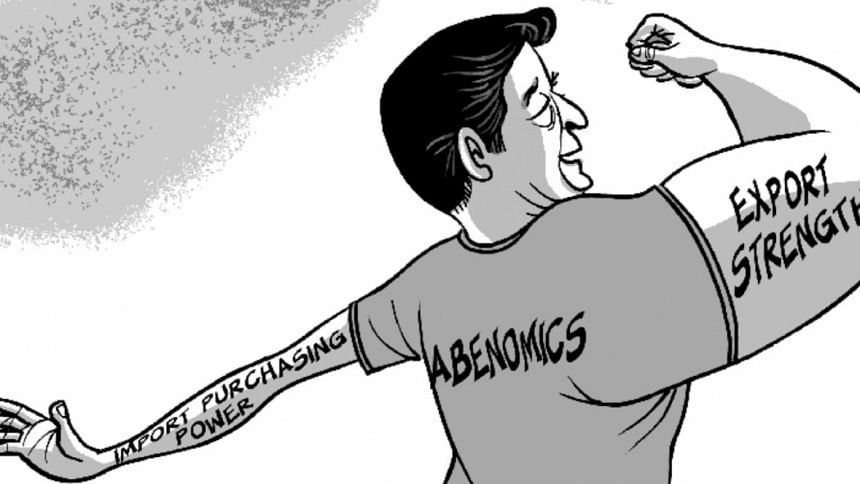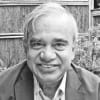Tokyo's policy of pacifism coming under threat

NOT all is going well these days with the Japanese Prime Minister Shinzo Abe. Overtly it might seem his boat is sailing fast in tranquil waters. It is true that his much heralded economic policy, dubbed as "Abenomics" by his enthusiastic supporters, had been able to lift the Nikkei to an all-time high in the last one-and-half decades and world-class Japanese enterprises like Toyota Motors were able to announce soaring profit margins reaching a new record high. However, purses of the majority of the Japanese people still remain very tight, as the good health of corporate Japan could benefit only those within that narrow circle. The proponents of Abenomics, happy with the statistical figures showing a glittering Nikkei and an all-smiling Tokyo, have virtually abandoned thinking about the less well-off segments of the society.
Branding this as a big success, Abe and his advisors now feel less beholden by economic issues, and instead are focusing more on their favourite topic of making Japan bigger and stronger. This they probably think is more important, as on the global stage the importance of Japan is waning fast with an emerging China quickly taking over the country virtually in every field. There is thus a need to show the world that Japan remains a formidable power, if no longer an economic one, then at least militarily; and the country is willing to throw away the shackles that once tied her firmly to the superficial idea of achieving the goal of a peaceful world by drifting away from the concept of military might. This was probably the clear message that the Japanese prime minister intended to convey to the world while addressing a joint session of the US congress last week.
The tone of the speech was set earlier at the two-plus-two ministerial-level meeting in Washington where Defence and Foreign Affairs chiefs of the two countries agreed on a revised text of defence guidelines. The revised text, among other clauses, is set to remove the geographic limits imposed on Japan on military matters and pave the way for Tokyo to exercise the right of collective self-defence. The revised guidelines, thus, would allow the Japanese Self-Defence Forces to join the US war efforts in global hot spots like the Middle East or in emerging contingencies like that of the South China Sea. The military agreement announced during Abe's state visit replaces the earlier guidelines focusing exclusively toward the defence of Japan. Japanese military forces, dubiously named the Self-Defence Forces to overcome the restrictions imposed upon by the constitution, would now be able to venture overseas to assist the US in 'war efforts' around the world.
So, it is no wonder that Japan's next door neighbours are cautiously assessing the possible outcomes of this latest Japan-US move and expressing uneasiness over Abe's congressional speech. A Chinese Foreign Ministry spokesman termed the latest US-Japan move as a product of the Cold War era and said that the two countries now have the responsibility to prevent the alliance from undermining peace and stability in the Asia-Pacific region.
While China is more worried about the military aspect of the Japan-US alliance, South Korea is more focussed on how the Japanese leader would address historical issues. And they too were disappointed. In his speech in Washington, Abe acknowledged Japan's war-time misdeeds by saying that the Japanese military had brought suffering to the people of Asian countries and expressed "deep remorse" for the suffering caused by his nation's wartime actions, but he offered no apology. The calculative omission of the word 'apology' from the speech had upset many in South Korea, and Dong-A Ilbo, a leading national daily of the country, did not hesitate to term the speech as a '40-minute deception'.
However, the Japanese delegation returned home in a triumphant mood as if something very significant with far-reaching consequences had been achieved. Meanwhile, the Japanese prime minister is now targeting the Japanese constitution to further cement this latest 'achievement'. Abe has already announced that his ruling party will now focus on ensuring a massive victory in next year's upper house elections that would guarantee a two-third majority of the ruling coalition in the upper chamber. The ruling block is now enjoying a two-third majority in the lower house and need the same in the upper house as well for any attempts to revise the constitution to be successful. However, his opponents, who see a serious threat in the strengthening of the Japan-US security alliance that might eventually take Japan to war, are not sitting idle either.
A big rally was held at Yokohama on May 3, which in Japan is observed as the constitution day, where speakers warned the gathering crowd of a grave situation that might drag Japan not only to war footing, but also to real war fought in distant places. Speaking at the rally, Kenzaburo Oe, Nobel prize-winning Japanese author, expressed concern that under Abe, Japan is marching toward a third world war, and said that Abe's policies of collective self-defence and proactive pacifism are mere self-justification for getting involved in a future war. Speakers at the gathering vowed to resist the attempt of revising the peace clauses of the Japanese constitution.
Thus, with the political situation in Japan gradually getting heated-up, the focus of attention is shifting quickly to how the proponents of constitutional amendment and their opponents are going to handle the issue from here on. As a result, the next upper house election, set for the summer of 2016, is destined to turn into a fierce battleground where the outcome most probably will decide the fate of Japan's pacifist policy centred on Article 9 of the constitution.
The writer is a Tokyo based Bangladeshi journalist. He also teaches at Japanese universities.

 For all latest news, follow The Daily Star's Google News channel.
For all latest news, follow The Daily Star's Google News channel. 



Comments